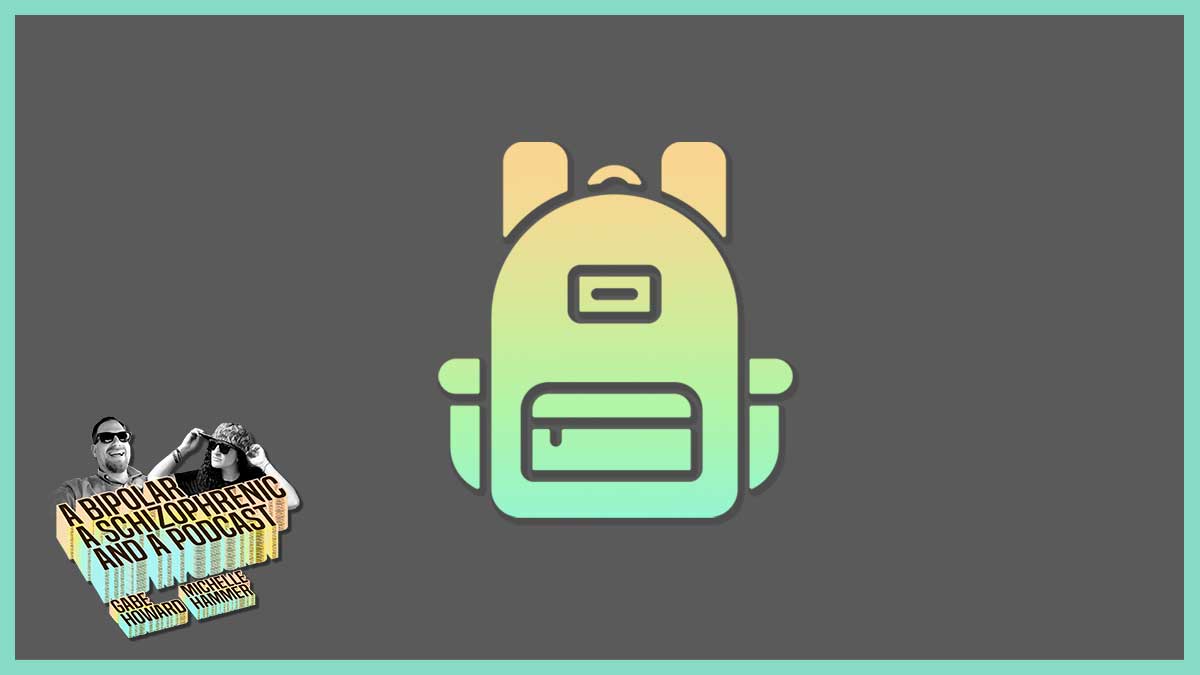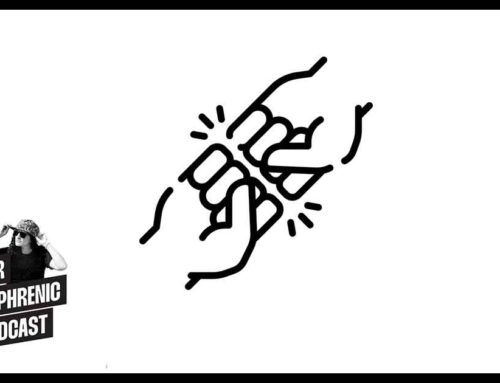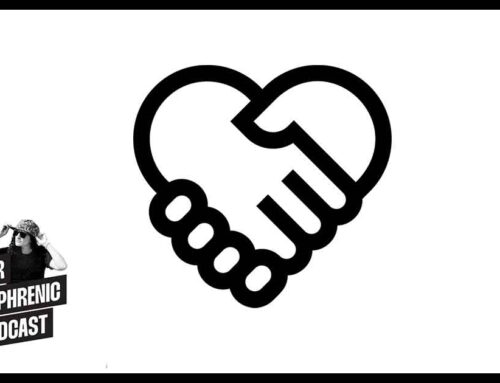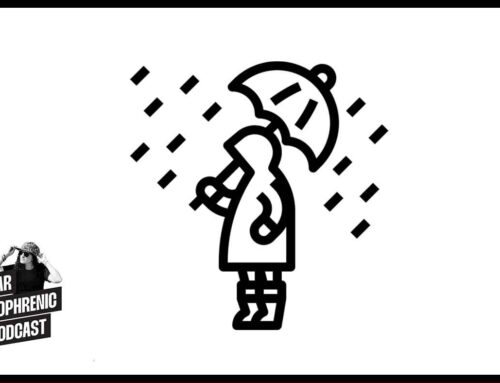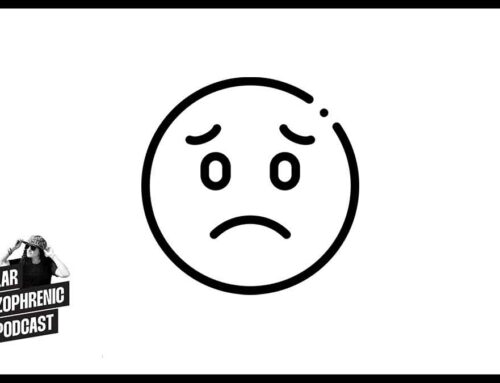Packing for a Psychiatric Inpatient Hospital Stay
from
A Bipolar, A Schizophrenic, and a Podcast
“Isn’t a pool cue like extremely dangerous in the psych ward? Like, you can’t have any hooks on the walls. But here’s a pool cue?”
–
Michelle Hammer
Being in the psychiatric ward is not the ideal way to spend a night, weekend, or longer. However, sometimes we find ourselves there.
What should you pack? What should you ask your friends and family to bring? What is generally allowed versus never allowed? Learn all this — and more — on the season three premiere of A Bipolar, A Schizophrenic, and a Podcast.
Hey! Follow Society of Valued Minds on Instagram by clicking here or search for @societyofvaluedminds.
This podcast is proudly sponsored by Betterhelp. Save 10% on your first month with the discount code “BSP22” or by clicking here.
Hosts of A Bipolar, A Schizophrenic, and a Podcast

Gabe Howard is a professional speaker, writer, and activist living with bipolar and anxiety disorders. Diagnosed in 2003, he has made it his mission to put a human face on mental illness.
He’s the author of Mental Illness is an Asshole and Other Observations and a popular podcast host. Learn more at gabehoward.com.

Michelle Hammer is a Schizophrenia Activist and spends her time passionately fighting stigma. She is an NYC native featured in the WebMD documentary Voices, which was nominated for a Tribeca X Award at the Tribeca Film Festival 2018.
Founded and run by Michelle, Schizophrenic.NYC is a clothing brand with the mission of reducing stigma by starting conversations about mental health.
Transcript
Please Note: This transcript was computer generated. Please be mindful of errors. Thank you.
Rated E for Explicit. Please be aware. Thank you.
Michelle: My name is Michelle and I have schizophrenia.
Gabe: My name is Gabe and I have bipolar disorder.
Michelle: The Society of Valued Minds, sponsored by Otsuka Pharmaceuticals, is a new community of mental health advocates building a platform on Instagram for seeking support, sharing our experiences and embracing the self-expression that makes us unique.
Gabe: To join for absolutely free. You just need to follow them on Instagram @SocietyofValuedMinds, and it really helps us out.
Michelle: We follow them. You should do it too.
Gabe: We also want to give a huge shout-out to our sponsor, BetterHelp. Get 10% off your first month just by going to BetterHelp.com/BSP22.
Gabe: Michelle, I can’t believe that we’re doing this show again. Again, like when we ended it the first time, I never thought we’d do it again. And then we did it again. And then after we ended the second time, I’m like, I never thought we’d do it again. And now we’re doing it again. Again. Can you believe that? We’re doing the show again? Again.
Michelle: Again and again and again and again. I know we did so many things again that we can’t even like. We just everything is again so many times and again and again. And did we say the word again so many times and again.
Gabe: It’s again squared or maybe it’s again
Michelle: Again, squared again.
Gabe: Cubed. I don’t, I don’t know how math works.
Michelle: Cubed. Again to the fourth power.
Gabe: Again, to the fourth power.
Michelle: The power of love.
Gabe: We’re just going to keep doing it again and again and again until people say not again.
Michelle: Not again?
Gabe: Not again. When people say not again then we won’t do it again.
Michelle: Don’t do it again, Gabe.
Gabe: Right.
Michelle: If you do it again, then you can’t do it even more time. Because you do it again. And then not again. And then again. And not again. Again. And doing it again.
Gabe: Eventually, we have to segue.
Michelle: But then you never learn your lesson.
Gabe: Again. We always segue again. Like, we do this little intro and then again, we segue.
Michelle: If you do it again you don’t learn your lesson, Gabe. You have to learn your lesson to not do things again.
Gabe: I never learn anything. Learning is not really our. We’re kind of like Seinfeld. No special episodes. Nobody learns a thing. We’ll see you next week. That’s. That’s.
Michelle: Oh. Okay. Good idea. I’ll get on that. You should have told me that about six years ago.
Gabe: Michelle, you know, sometimes in managing severe and persistent mental illness, bipolar and schizophrenia, major depression, psychosis, sometimes we make the decision to admit ourselves to the psychiatric hospital. We’ve talked a lot about unwanted commitment, civil commitment, being committed. I mean, that topic comes up a lot. I was committed to the psychiatric hospital,
Michelle: Committed.
Gabe: But yeah, committed. It sounds scary, right?
Michelle: It’s the only commitment you really don’t want to make.
Gabe: Really? Really? You’re a? You’ve made a lot of commitments in your life? How many jobs you had? How many exes? The only thing that you have quit more than jobs is. Is relationships.
Michelle: You know, I’ve broken up with quite a few people. That’s true.
Gabe: That’s true.
Michelle: I have.
Gabe: You think?
Michelle: I broke up with somebody once because they said our song should be You Are the Reason by Hoobastank.
Gabe: That’s it. Yeah. That’s an immediate disqualifier.
Michelle: He actually died by suicide about a year ago.
Gabe: Wow. Just. [Bomb fall whistle]
Michelle: Now, I really can’t ever listen to that song.
Gabe: Just. Oh, Michelle, I mean, that is, sincerely, that is some real talk. But, but wow. What goes on in your brain?
Michelle: Sorry.
Gabe: No. I, I mean.
Michelle: I was looking at some old pictures this weekend when I went home and I was like, oh, there he is. There’s that photo of him.
Gabe: I feel really strongly like Lisa right now is playing this back and back and trying to decide if she should leave it in. I mean, I can, I can see, I can, I can, I can feel, I can’t see I can feel the pain like she’s like on one hand, that was real. That was a real moment that Michelle had about a loved one, about a relationship. And like, that’s, that’s like, real. On the other hand, wow, Michelle.
Gabe: Wow.
Michelle: I haven’t seen him in over ten years.
Gabe: I just.
Michelle: Okay, well, what we’re talking about, Gabe?
Gabe: What we were supposed to be talking about was admitting yourself into the psychiatric hospital, because, again, you can choose to admit yourself. You can ask to be admitted. You can go to the emergency room, you can talk to people and say, hey, look, I’m not doing well. I feel like I’m a danger to myself or others. And I would like to be admitted, right? You end up in the same place, behind the same locked doors with the same thing. But you’ve admitted yourself into the hospital rather than having been committed to the hospital. Same result. Different vibe.
Michelle: Well, see, one time I had had a suicide attempt and I needed to go to the hospital because I thought my stomach was on fire and I couldn’t stop vomiting. And I was hoping they would just help me live. But then they committed me. So what does that count as?
Gabe: Well, did you intend to be committed to the psychiatric hospital?
Michelle: My intention was, well, I was also 18 years old, so I thought maybe if I bring myself in, they’ll save my life and then I can go home.
Gabe: Well, yeah, that is. That is the goal. But you.
Michelle: Well, I thought I wasn’t going to be committed to the psych ward. I thought they would just make sure I wasn’t going to die and be like, Oh, good thing you came in. We made you not die. You can go home now. But no, no, no. They’re like, no. And then there’s a 72 hour rule. Aha.
Gabe: So that was like a hybrid, right? You thought it was a physical issue and that you would just get it fixed up, get some medicine, take two of these and call me in the morning kind of deal and then just go home. But it turned out that it was a mental health issue. And you were committed to the hospital for 72 hours. So?
Michelle: Well, it was longer than that, but we can get into that. But,
Gabe: Well,
Michelle: You know.
Gabe: I mean, let’s not fall down the rabbit hole in that. I would say that on the spectrum of ending up in the hospital, that’s still it seems like it was out of your control. You were not expecting to be admitted, so you were not prepared. And it seems like you’re upset about it.
Michelle: Well, you know, Gabe, you know that I’m not the biggest fan of the psych ward.
Gabe: Yeah. because people are.
Michelle: I don’t think it ever really helped me. I just don’t think it ever. Gabe, it never was positive experiences for me.
Gabe: But what stabilized you? That part was positive. The rest of it was shitty.
Michelle: No. It taught me how to lie.
Gabe: Really? That’s the only message that you have from the psych ward? You don’t, you don’t feel like you were unstable when you showed up at the psych ward and you were stable when you left?
Michelle: No. I was traumatized.
Gabe: But stable.
Michelle: No.
Gabe: Really? Are you stable now?
Michelle: Yeah.
Gabe: What contributed, like for your journey? What do you credit with that stability?
Michelle: My doctor getting me on the right meds.
Gabe: The doctor getting you on the right meds?
Michelle: No psych ward ever got me on the right meds.
Gabe: Do you feel that they were part of that journey? However, I mean, I understand that the psych ward didn’t get you on the right meds, but did they give the doctor data that helped the doctor get you on the right meds? Does that make sense? It’s kind of like does dynamite build a house? No. Well, yes, it does, because you’ve got to like bomb out the basement to build the foundation. So in that way.
Michelle: No. No.
Gabe: No.
Michelle: Traumatized. Traumatized.
Gabe: So you’re never, it is safe to say that Michelle Hammer is never going to voluntarily admit herself into the hospital.
Michelle: Agreed.
Gabe: Okay. I completely understand and I respect that. But many people do, myself included. Now, one time I showed up at the hospital and I wanted to be admitted and I said, Listen, I need to be admitted to the hospital. And they talked to me and they determined that I didn’t need full-on hospitalization. Like where you sleep there behind the locked doors. They put me in an intensive outpatient program. But, I was fully prepared. I was ready to walk through the doors and have them lock behind me. So I, I want to, like, focus on that little, that little window of thought.
Michelle: That’s true. Be prepared. That is true. You’ve got to be prepared if you know you’re going. Because even though that time that I brought myself that I was, like hoping that I wouldn’t be committed, I did have an inkling I might be committed. So I did pack a bag.
Gabe: What did you put in the bag, Michelle?
Michelle: Well, it was back in the day, you know, so I packed an iPod with an iPod charger and my phone charger. That’s what I got.
Gabe: Back when phones and music players were two separate things.
Michelle: Yes.
Gabe: Michelle, man, you’re old.
Michelle: Not as old as you.
Gabe: That’s that’s that’s that is that is not wrong. I remember back when these things didn’t exist, like I was the Discman and Walkman generation. So
Michelle: Walkman.
Gabe: Yeah, I loved my Walkman.
Michelle: What cassette tapes did you bring?
Gabe: Well, I didn’t. I didn’t bring any cassette tapes. I didn’t know I was going to be admitted, but I didn’t have a cell phone and I showed up just completely unprepared for all of this. But putting this in 2022, you can’t bring a phone.
Michelle: I know there are some hospitals in New York City that do let you keep a phone. People have told me that.
Gabe: And how does it work? Because I know we have like HIPAA. And listen, I’m like super cool with not being allowed to bring a phone because I don’t want to be crying in a corner screaming that a demon is trying to eat my brain and have some other patient live stream that shit on Facebook.
Michelle: Oh, I would never want that live streamed. That would be terrible. No, I wouldn’t want that.
Gabe: Right.
Michelle: But there are places I’ve heard that let you keep a cell phone. I don’t know how much access you have to the web or if it’s all screwed up on the phone. But you can have a phone. And I know when I was in the psych ward, I kept saying, can I just see my phone to get a cell phone number? But I would really be texting my friends, call the payphone, call the payphone, call the payphone or just call this number or call this number. And then the phone would ring and be like, hey. And they were like, What? What is this number? Where are you? And I’d be like, You don’t even know, bro. You don’t even know.
Gabe: It’s fascinating to me. I sort of think that psychiatric wards, like everything else, need to update with the times and they need to make, like, little rooms, right? We’re going to call them phone booths.
Michelle: [Laughter]
Gabe: Where you’re allowed to go in that room and use your phone. But, you know, before you can come out of that room, you have to like drop your phone in a bag or just some way so that people can utilize their phones. Because for many people, they’re soothing, right? They have apps that help them manage their medication, their meditation, their mindfulness. I mean, just think of everything that lives on your phone, and then suddenly you can’t use it. I, I completely see the need to both have your phone and not have your phone, because, again, Gabe Howard in the psychiatric ward is not something I want somebody taking a video of. It’s these are private moments that I don’t want getting out. Like privacy is important.
Michelle: Privacy is important. I don’t want people videoing me. But what about people videoing, just like documenting their psych ward experience?
Gabe: Well, does that psych ward experience include other people?
Michelle: Well, I would hope not.
Gabe: Well, yeah, so.
Michelle: I would hope it’s just them.
Gabe: Sincerely. I don’t know what the right answer is, because on one hand you separate me from my phone and I’m rocking back and forth, and I mean that sincerely. That’s not even a joke. My phone has everything. It has timers to take my medication. It has things to distract me, like when I need to fidget. It’s the way that I keep in contact with my support system. So if I’m in a meeting and I’m starting to zone out, I can text Michelle like, man, this meeting sucks and Michelle can send me a joke because Michelle gets it. She’s been in all these mental health meetings too, so she knows exactly what to say. All of these things help me maintain my stability.
Michelle: What about, like, social media? Sometimes social media can be so triggering.
Gabe: Well, yeah. Then you go back the other way.
Michelle: So if you’re on your phone, you’re on Instagram, you’re on TikTok, you’re on Twitter, you’re reading things, and it could just trigger you into a bigger episode.
Gabe: So what do you do with that? Okay, so I am fairly certain I would be willing to bet good money that the majority of psych wards do not allow phones, especially smartphones, that are connected to the internet for all of the HIPPA reasons that we have just stated. So what do you bring instead of a phone? Right? Many people are just like, hey, if I had my phone, I’m cool. Excellent. You don’t have your phone. What’s plan B?
Michelle: Journal?
Gabe: Journal. All right. So. So you think
Michelle: A book.
Gabe: Books. Books. All right.
Michelle: One time I brought my computer, but I could only use my computer in the main room. And I wasn’t connected to the internet.
Gabe: Okay. Well, that’s.
Michelle: And they kept telling me to do my homework for school. I said, I need the Internet for that.
Gabe: It does make it difficult.
Michelle: So there goes my frustration even more. And then, of course, I’m on my computer and in the main room everyone kept coming over to me. Oh, you have a computer? Like, just leave me alone. Leave me alone.
Announcer: This episode is brought to you by The Society of Valued Minds sponsored by Otsuka Pharmaceuticals. If you believe that every mind is valuable and if mental health matters to you, you should join the Society of Valued Minds for free by following them on Instagram @societyofvaluedminds. We are a community of advocates and creatives who want to show the world that self-expression is stronger than stigma. Check out www.societyofvaluedminds.org to learn more. I’m a proud member and you should be too. Listener, your mind is valuable.
Announcer: This podcast is sponsored by BetterHelp. BetterHelp is not a crisis line, it’s not self-help. Instead, it’s professional therapy done securely online. BetterHelp will determine your needs and match you with your own licensed professional therapist in under 48 hours. You’ll get timely and thoughtful responses plus you can schedule weekly video or phone sessions, so you won’t ever have to sit in an uncomfortable waiting room as with traditional therapy. Visit BetterHelp.com/BSP22 and get 10% off your first month. Join the over 2 million people who have taken charge of their mental health. That’s BetterHelp, H E L P. Go to BetterHelp.com/BSP22.
Michelle: And we’re back and what should you bring to the psych ward?
Gabe: What about magazines? Are magazines still a thing?
Michelle: They’re called blogs now.
Gabe: But they’re on the Internet. So obviously you need your phone. So that’s not going to help.
Michelle: I mean, you could read, like, what’s it called? What’s that, mag? Is that like. Oh, they. You National Geographic. You could read some National Geographic.
Gabe: Huh? Of all the magazines in all the world, the only one that you could come up with was National Geographic?
Michelle: I know it’s still a magazine.
Gabe: That’s fair. Just FYI, you can’t bring porn magazines. So Playboy, Penthouse, those are out.
Michelle: That’s true. And when your friends come with some of your stuff, they go through all of your stuff.
Gabe: That’s a good little tidbit, whether you admit yourself or whether you were committed.
Michelle: What do you mean?
Gabe: I mean, if you’re in the hospital for any reason, whether by choice or because you were committed, if your friends bring you stuff, they’re going to go through it.
Michelle: That’s true.
Gabe: Just keep that in mind.
Michelle: Yeah. They go through it and they decide what you can have and what you can’t have. Like you can’t have a pen. You could have a marker.
Gabe: What about a deck of cards? Like, is that a good thing? Like, would you sit around the psychiatric ward and play cards with the other patients?
Michelle: If they knew how to play cards.
Gabe: Why do they not?
Michelle: What cards?
Gabe: I don’t know.
Michelle: What card game are you playing with people? That everyone’s playing? I didn’t play cards with anybody.
Gabe: I don’t know. Go Fish, Uno? Why don’t you bring Uno? Is Uno a good
Go Fish, Uno? Can you bring? If you can bring Uno. Now you want to play Uno with people?
Gabe: Why would they not let you bring Uno? Why would Uno be on the?
Michelle: I played pool. I played some pool with people.
Gabe: Just why is?
Michelle: Just I played pool. Just how, isn’t a pool cue like extremely dangerous in the psych ward? Like, you can’t have any hooks on the walls. But here’s a pool cue?
Gabe: Really? They gave you a pool table with those hard metal. What are those ivory balls? I mean, I know they’re not real ivory, but like porcelain balls that weigh 87, they let you have pool balls?
Michelle: Yeah. And I beat a homeless guy.
Gabe: Wait, wait.
Michelle: I didn’t beat him up. I beat.
Gabe: Oh,
Michelle: I beat in pool. I beat a homeless guy
Gabe: [Laughter]
Michelle: In pool.
Gabe: Yes. Okay. Thank you for clarifying that, because you almost gave me a heart attack. Do you know I. You’ve heard my story before, Michelle, that they wouldn’t let a ping pong table exist because they said, you know, the paddles were too dangerous, the netting you could use to hang yourself. Right? Was this pool table with the cue sticks and the and the heavy porcelain ivory balls was this thing right in the main room or did you have to, like, have a special pass?
Michelle: We just had to ask for the supplies to play pool. And then we were supposed to be monitored the whole time, but the nightshift was lazy, so they would just let us play. Or we would ask and they would just say, No, not right now.
Gabe: Okay. So there was there was, there was some attempt to keep people safe around the pool table.
Michelle: Right. But we could play ping pong at all times.
Gabe: Wait, you got a ping pong table?
Michelle: We’ve gone over to this, Gabe. Yes, I had a ping pong table and the same 75-year-old lady would play ping pong with me for 3 seconds.
Gabe: [Sigh]
Michelle: And then she would sit back down.
Gabe: This is devastating to me. Why does Michelle get all the nice things? Like, I work just as hard as she does, but all of you love her more. I work just as hard as she does, but all of you think that she’s the best. I was just as sick as she was, but I didn’t get a ping pong table. You’re my, you’re my schizophrenic nemesis.
Michelle: If you insist. I also got five different guys’ numbers. When I left. I got everybody’s number. I got all these guys’ numbers.
Gabe: Just out of curiosity, Michelle, what does you hooking up in the psych ward have to do with?
Michelle: I didn’t hook up with anybody. I’m just saying.
Gabe: Did you give your number to anybody?
Michelle: Absolutely not.
Gabe: Did you call any of the numbers?
Michelle: Absolutely not.
Gabe: Now. Did you not call the numbers because of stigma?
Michelle: Why would I want to be reminded of the psych ward by calling the people that I hung out with in the psych ward?
Gabe: Isn’t this like the greatest meet cute story ever?
Michelle: Why would I do that? Why would I want to date these people? Why do I want to, like, meet up with these dudes? Like, I don’t want to meet these guys. I don’t want to hang out with them now. I don’t want to be with them ever.
Gabe: Listen, I’m being super serious here. Isn’t this, like, the greatest meet cute story ever? Mommy, Daddy, how did you meet? Let me tell you. [Singing]
Michelle: We played pool together.
Gabe: [Singing]
Michelle: And then when we were playing pool, I won.
Gabe: It could be called How I Met Your Schizophrenic Mother.
Michelle: How I Met Your Schizophrenic Mother?
Gabe: Or now they have a spin off, How I Met Your Bipolar Father.
Michelle: Yeah, the psych ward. Should there be a psych ward comedy? A psych ward sit-com comedy?
Gabe: A psych ward comedy? What would it be called?
Michelle: Crazy House.
Gabe: Probably something stupid like Friends.
Michelle: Crazy House.
Gabe: Crazy house. You got to get the word crazy right in there?
Michelle: Well, I don’t. What? What do you think it should be called? What, what do you think it should be called?
Gabe: I don’t, I, I, I want to, I don’t know, A bipolar, a Schizophrenic, and a Television Show about people living in a psychiatric ward?
Michelle: That sounds like a great idea. I think that should be the name of it. I think it’s going to be the best, the best show ever. Let’s be producers. We’ll cast everybody. We’ll just pick them off the corner of the street and be like, Go, reality show.
Gabe: What does any of this, and not that it matters. That’s the cool thing about our show. But what does any of this have to do with preparing yourself to voluntarily admit yourself to a psychiatric hospital or ward?
Michelle: Uhm, well, I guess when you come out of the psych ward, you end up talking about stuff like this.
Gabe: You know, that’s a really good point. I think that it’s good that people openly talk about it. We get a lot of email and people always talk about how they like that Michelle admits that it’s a screwed up experience. Like that’s it’s one of the things that people love about the show that that we’re just like, no, it sucked and we hated it. Like the end. Well, isn’t there a lesson to be learned? Yeah, the lesson is that it sucked and we hated it. And you go on to talk about how much it sucked and you hated it, but to give some folks some like maybe some tangible takeaways. We’ve talked about this fact that you’re probably not going to be able to have your phone. Right. And we talked about, you know, if you can get a book, a magazine, a journal, markers, you know, things like that, a deck of cards, you know, whatever. But is there anything else that you need to know? Like when you’re packing that duffle bag? Like, what does what does a psychiatric ward go bag need to look like?
Michelle: Toothbrush? Toothpaste?
Gabe: I mean, a toothbrush and toothpaste is practical, I guess, but I mean
Michelle: Practical. I’m just thinking.
Gabe: I don’t know. What else?
Michelle: What else in the to go bag? That’s a very good question. Underwear. A bra.
Gabe: I mean, underwear is important.
Michelle: Bra is important.
Gabe: I don’t need a bra. Since it doesn’t affect me, I don’t want to talk about it.
Michelle: Oh. You want me to talk about a bra?
Gabe: I, I know nothing about bras. It’s just put your bra in there. What do you? What do you need my help with? Do you want me to pick out your bra for you?
Michelle: I don’t know. I think there’s some rule. There’s like rules about underwire bras. But like I went in college where I always wore a sports bra because I was an athlete. But I think they check you for underwire bras because who knows what people will do with the underwire of the underwire bra in the psych ward? But you don’t want to mess around with that. I’m just saying.
Gabe: I, I’m not being funny, Michelle. I can’t tell if you’re joking. Is the underwire in a bra thing in a psychiatric hospital?
Michelle: It definitely is. It definitely is.
Gabe: Is this? I. You’re. I’m, I’m. I know the audience can’t see, but I’m, like, staring at Michelle. Ready for her to say no? That one’s the lie. It just. It doesn’t make sense that I know that I am women’s. Women’s bra, they’re made a certain way, right? I mean, they have the hooks in the back. They clip, they have the underwire, if, you know, based on your size. I mean, there’s, I’m struggling with this concept of you can’t have the clothing that you need. Do? What is the? You’re being serious?
Michelle: Right. Just bring a sports bra.
Gabe: Okay. So you? I think this is a messed up rule, but fair enough. It is a rule. Bring a sports bra. No underwire. But what if you need an underwire? Like is there. I mean, I guess.
Michelle: Well, I guess you’re just having hanging boobs.
Gabe: I guess you are. Fair enough. Are there any rules for women’s underwear? Like men, there’s no rules. I mean, we can have boxers, briefs, thongs. We can, we can bring any underwear that we want.
Michelle: Oh, do? Do you bring a thong when you go? Do you bring a thong?
Gabe: I do. It’s not mine. I just carry it, like, in my pocket.
Michelle: Oh, okay. Cool, cool.
Gabe: I found it on the subway. And remember, I live in Ohio. So that’s the restaurant. Not the, not the trains.
Michelle: You know what? My friend was in a psych ward and this stuff to bring what they had to do because they were afraid of bedbugs. All of her stuff that she packed for herself for two days went into a freezer to kill any bedbugs. And then she got her stuff.
Gabe: Wow.
Michelle: Yeah.
Gabe: But, I’m just I’m trying to plan this out in my head. You know, many people are only in the psychiatric hospital for three, four, maybe five days. So
Michelle: Yeah.
Gabe: Your stuff is gone for two days. What do you do for the first two days?
Michelle: You’re wearing hospital gowns
Gabe: Oh, that sounds.
Michelle: And, and, flip, little flip flops they give you.
Gabe: Is there anything that somebody can do to avoid the 48 hour freezing quarantine of their clothing for the bedbug initiative?
Michelle: I suppose you could bring new clothes with tags on them. You could try that.
Gabe: I’ve heard of that working, but that of course. That’s great, if you’re planning to admit yourself, I guess you can go out and buy clothes. I know people that pack a go-bag for various jobs. They just have a bag that has stuff in it. My father always did this because he was a truck driver and didn’t know when he was going to get his work call. So he just packed his bag ahead of time. And if they called him in 12 hours, he was ready to go. If they called him in three days, he was ready to go. So is a psychiatric go-bag something that our community should be thinking about? I, I mean, I guess you could throw a new shirt, you could get a Michelle shirt, you could throw leggings, you could get Michelle leggings you could throw. I sell books. You could throw a copy of Mental Illness Is an Asshole in there. Remember we said bring a book.
Michelle: [Laughter]
Gabe: But it’s clear that we’re just shilling for our own products. What would you put in this go-bag? A book, a magazine, maybe an MP3 player, maybe a Sony Walkman and obviously clothes with tags on it, I guess, and a bra with no underwire.
Michelle: Which is just a sports bra or just a regular bra. I mean, you’re thinking like everyone has gigantic boobs, Gabe. Not every bra has underwire in it.
Gabe: Listen, listen. I know that nobody, I know you can’t see us right now, but everybody’s seen Michelle on stage. You’ve seen her picture. Nobody has seen Lisa. But, but Lisa has, she’s shaking her head like we can see her through that. And she’s just she’s just like she’s just she I
Michelle: She’s like don’t say it.
Gabe: I want to bring her on to. It’s fascinating to me. The two of you might have a throwdown about women’s bras right here on the show.
Michelle: [Laughter]
Gabe: Utterly fascinating. The dynamic between, and now they’re just now they’re in some sort of staring contest and like both their breasts and their eyes are staring at each other. Like, it’s the weirdest thing I’ve ever seen. Michelle is of the I don’t care camp, just bring a sports bra and Lisa is of the a sports bra does nothing for me. I hate you.
Michelle: [Laughter]
It’s that’s all I can say. I’m now getting the. Yeah, yeah. Now, now Lisa is giving me that twirly finger, which means move on and Michelle is now giving me the finger. All right, that was, that was incredible. That was that was my favorite part of the new season. I just want everybody to know.
Michelle: Boobs. Boobs, boobs, boobs, boobs.
Gabe: I mean, there’s nothing more to say. Thank you, everybody, for listening to A bipolar, a Schizophrenic, and a Podcast. My name is Gabe Howard and listen, I am the author of “Mental Illness Is an Asshole and Other Observations.” You can get it from Amazon or you can get it from my website and I’ll sign it and throw in free stuff. That website is gabehoward.com.
Michelle: And I’m Michelle Hammer and I can be found at Schizophrenic.NYC, which is where you can get all my awesome shirts, pillboxes, leggings, mugs, stickers and more.
Gabe: Both of us are public speakers and you can reach us on our respective websites and listen. Do us a favor. Recommend this podcast to a friend. Like use your actual words. Go up to somebody and say, Hey, you need to be listening to a bipolar, a schizophrenic, and a podcast on your favorite podcast player. We also want to give a huge shout-out to our sponsor, BetterHelp. Get 10% off your first month just by going to BetterHelp.com/BSP22. And you, you, you, you right now. Don’t forget to subscribe or follow to the show. It is absolutely free.
Michelle: Boobs.
Announcer: You’ve been listening to A Bipolar, a Schizophrenic, and a Podcast. Previous episodes can be found on your favorite podcast player or by visiting ThisEmotionalLife.org/BSP. Have comments or show ideas? Hit up the show at BSP@ThisEmotionalLife.org. Gabe and Michelle are not medical professionals. This podcast is not a substitute for medical advice and is for entertainment purposes only. If you need help, please call your doctor, emergency services, the national suicide hotline at 1-800-273-8255 or text HOME to 741741. Thank you for listening.
